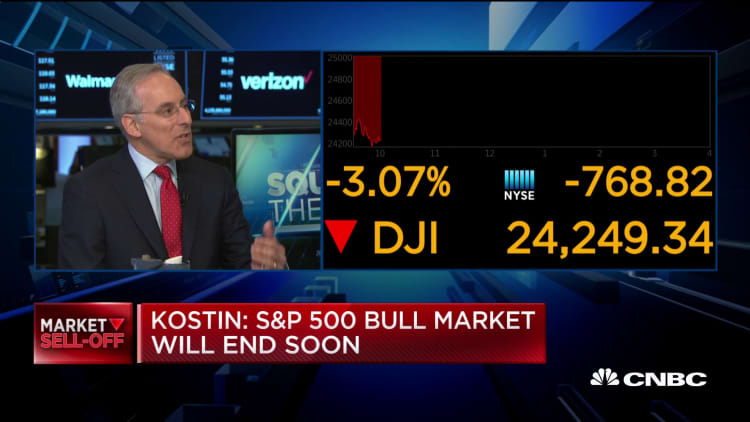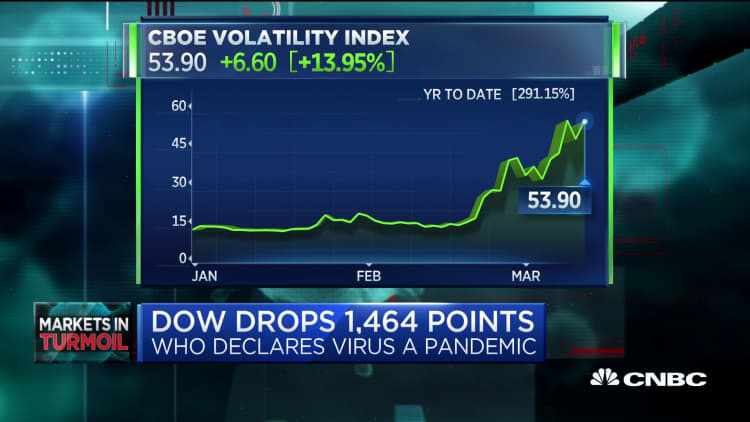The Dow Jones Industrial average fell into bear market territory Wednesday, and some analysts see a decline of another 10% or more before the selling subsides.
The Dow has lost 20.3% on an intra-day basis since Feb. 12 and a little more than 20% on a closing basis. A 20% decline is considered bear market territory. The S&P 500, down 4.9% Wednesday, temporarily touched a 20% loss in volatile afternoon trading. It is now 19.2% off its Feb. 19 high.
Goldman Sachs chief equity analyst David Kostin said Wednesday he expects the S&P 500 to hit a low of 2,450, more than 10% below its current closing level of 2,741. Kostin based his new view on a reduced expectation for S&P 500 earnings.

"I'm thinking maybe something like 2,400," said Sam Stovall, chief investment strategist at CFRA. "If we end up with no earnings growth in 2020, we end up with a 15 multiple...that brings us to 2,460."
Stovall said the 20% drop in the S&P 500, if it were on a closing basis, would be the swiftest, in data going back to World War II. Rapid drops also have ended up being followed by quick reversals.
"The average bear market has been 33%, going back to World War II. Five of the six bear markets that included very rapid declines to 20% ended up being well below the average," he said. "Six of the 12, because they ended up falling so fast, their ultimate bottom ended up averaging only 25%." That means there could be a quick rebound from a bottom, once it is reached, he said.
"It's like ripping off a band-aid. The faster you do it, even though it's a greater shock, it's over more quickly," he said.
As the coronavirus spreads, fears are rising that its economic impact could also be potentially greater and corporate earnings will take a bigger hit.
Jonathan Golub, chief U.S. equities strategist at Credit Suisse, said he now sees a contraction of 8% in second quarter S&P earnings and a 2.1% decline in the third quarter. By the fourth quarter, he expects to see earnings rebound and grow by 10.1%.
Golub cut his earnings per share estimate for the overall S&P 500 for 2020 to $165 from $175, a decline in expected growth of 6.2% from 0.2%.
The market has increasingly fretted about the slow response by Washington to the spread of the virus. Economists say the Fed is taking action and is expected to take more, but a fiscal response is needed to head off a recession. Economist say targeting industries that are hard hit, like airlines and cruise lines, would help. In addition, providing support for unemployed workers is also expected.
But so far, there have been no firm plans, though the White House is expected to release its full proposal soon and the House is voting on legislation to help workers on Thursday.

Ed Keon, chief investment strategist at QMA, said he expects more selling, but the amount is hard to predict. "It's hard to put a number on. Only a fool would try to say this is the bottom, but does that mean it's another 5% or lower? It's hard to say. It's going to depend on factors we don't know yet. Our base case right now is a shallow recession in the U.S."
Strategist are expecting the second and third quarter to take the brunt of the hit from the virus spread. By summer, the consensus view is the virus should have peaked and the economy should stead and rebound into year end.
"We've done substantial damage, and there is some value being created. It's not like stocks are so cheap, you have to buy them. I don't think this is the end of the world," said Keon. "The market is looking at this and saying it could be a major problem. So tough action to protect the public, combined with monetary stimulus, could halt the drop. And if we see the number of cases start to peak, while that could take a while, I think we could rally back. That's what it's going to take. You really need to have a public policy response."


